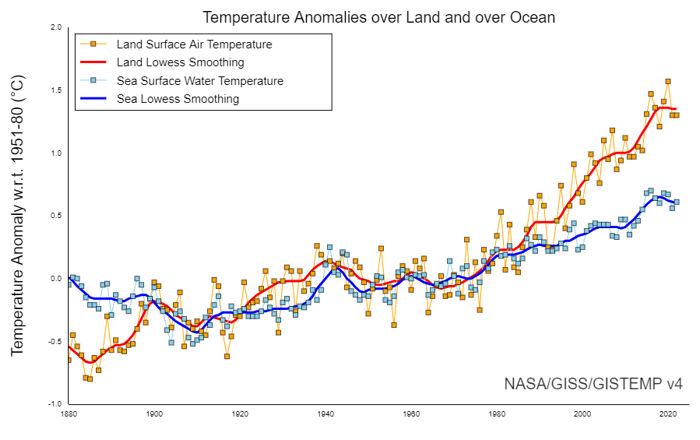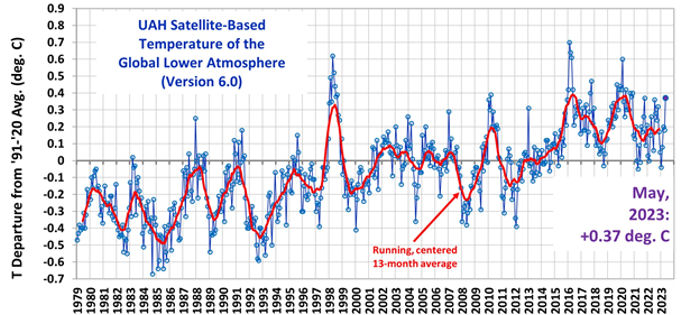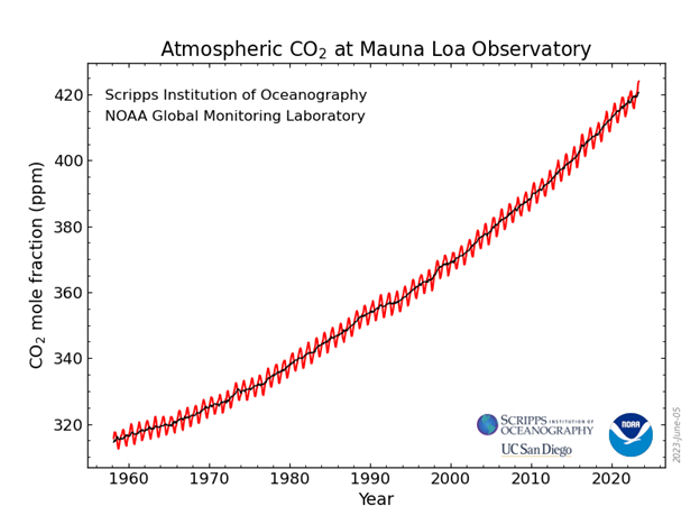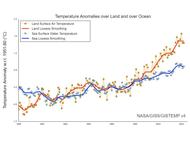Climate Change & Weather - ORIGINAL CONTENT
- By:
- Edward A. Reid Jr.
- Posted On:
- Sep 5, 2023 at 7:00 AM
- Category
- Climate Change
The two previous commentaries, Climate = Sum of Weather and Climate Events & Weather discuss how climate is established and how specific climate events affect weather. However, the far more controversial topic is how climate and particularly the recent climate change affects weather now and might affect weather in the future.
The Modern Warm Period essentially began with the end of the Little Ice Age and the start of the industrial revolution in the late-1800s, as shown in the graphs below from NASA GISS and UAH.


However, the warming of concern has occurred mostly since the 1950s, the period when anthropogenic CO2 emissions began to increase significantly, as shown in the graph below.

The increase in global average temperature, measured as anomalies from some reference climate period, has led to concerns that continued increases in anthropogenic CO2 emissions would lead to continually increasing global average temperatures and to significant changes in regional climates and the global climate overall. The increase in the global average temperature anomaly is approximately 1.0(+/-0.2)°C over a period of approximately 150 years.
The potential climate-induced changes of concern include changes in the frequency, duration, extent and severity of weather events such as tropical cyclones, droughts, floods and tornadoes. There are also concerns regarding increases in sea surface temperatures and sea level rise associated with the increasing sea surface temperatures and with glacial melting.
The IPCC Working Group 1 analyzed these issues and reported low confidence regarding any significant trends in any of these weather event characteristics. However, the IPCC Summary for Policymakers and later the IPCC Synthesis Report essentially ignored this analysis. Their publication, accompanied by dire press releases and hyperbolic declarations of “Code Red” by the UN Secretary-General and others, has stirred concern that the nations of the globe have not done enough to halt climate change and that “greater ambition” is required to avoid “climageddon”. Cries of “Earth on Fire” and “Boiling Oceans” have poured forth from the cheerleaders of climate doom, regardless of the fact that the available data do not support and frequently contradict their assertions.
This concern regarding worsening of weather events has spawned numerous efforts at attribution of purported current or potential changes such as more frequent or stronger hurricanes, more frequent or massive floods, longer and more extensive droughts, more frequent or more powerful tornadoes, etc. to climate change caused by global warming. There is even an effort to produce instant attribution studies to maximize attention while the analyzed weather event is still “front of mind” with the public. These attribution studies are based on unverified and unvalidated models, as are the projections of future climate change.
One of the most inexplicable aspects of these concerns is the assertion that climate change threatens food production in the face of confirmed global greening and record global food crop yields, while at the same time numerous national governments are beginning to take action against farmers, taking productive farm land and requiring reduction in herds of dairy cattle and meat animals.
Meanwhile, in the face of developed nation angst, the developing nations continue to increase fossil fuel use and emissions at a rate which more than offsets the emissions reductions by the developed nations and total global annual emissions continue to rise unabated.


